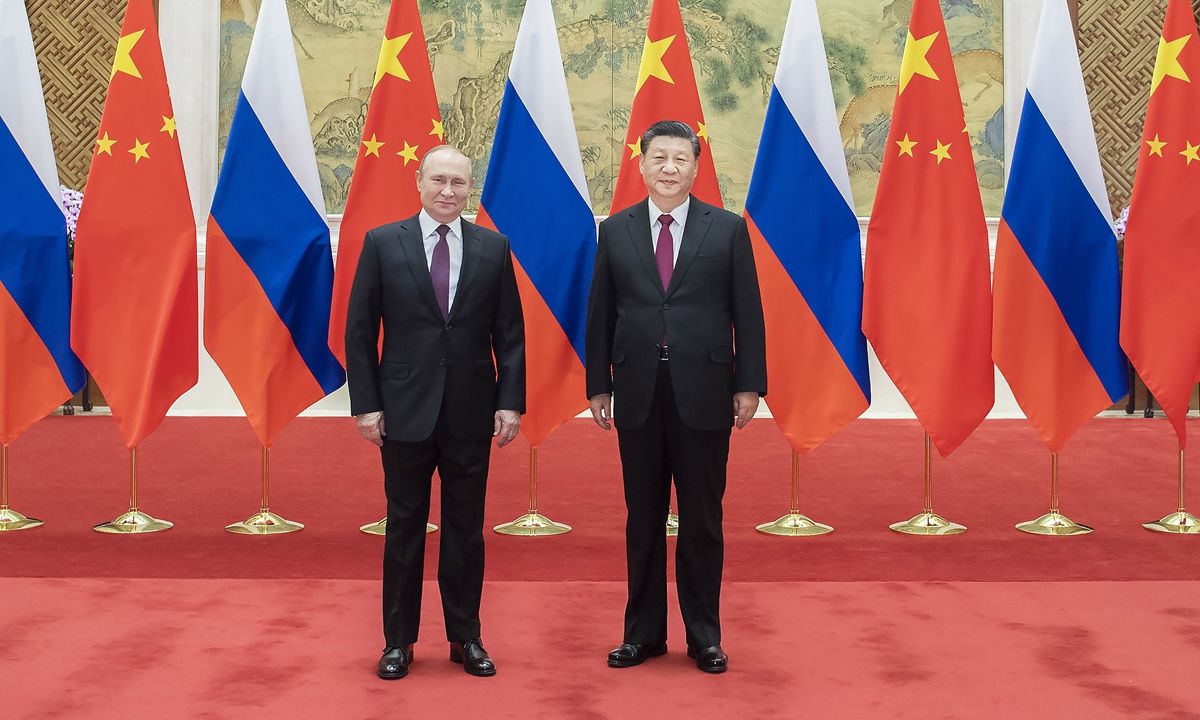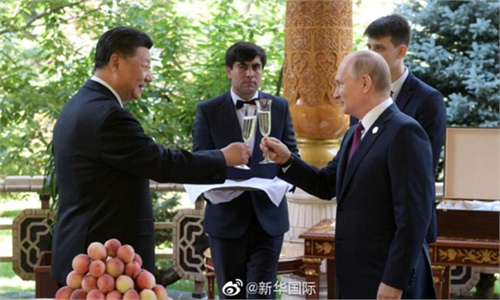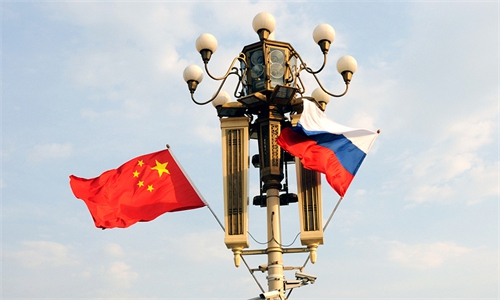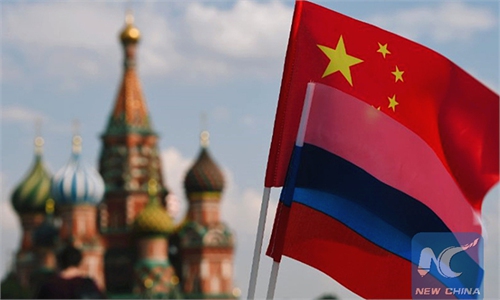Unprecedented China-Russia ties to start a new era of intl relations not defined by US
Joint statement highlights close coordination, rejects US hegemony

Chinese President Xi Jinping (right) meets and holds talks with visiting Russian President Vladimir Putin at the Diaoyutai State Guesthouse in Beijing on February 4, 2022. Photo: Xinhua
Following the highly anticipated meeting between Chinese President Xi Jinping and Russian President Vladimir Putin on Friday, China and Russia issued a lengthy joint statement that elaborated on shared views and consensuses on major global and regional issues and delivered a scathing rejection of the US-led West's hegemony that increasingly threatens global security and stability, a move that experts say ushers in a new era of international relations.
During the meeting ahead of the opening ceremony of the Beijing 2022 Winter Olympic Games, Xi stressed the further deepening of "back-to-back" strategic coordination between the two countries in upholding international fairness and justice and adhering to the four consensuses in supporting each other's sovereignty, security and development interests to better tackle external interference and regional threats.
The two countries' broad consensuses on almost all core issues related to global strategic stability, expressed during the meeting of the two leaders and stated in the nearly 6,000-word joint statement, are extremely rare and will further boost close strategic coordination that helps ensure global stability and peace, Chinese experts said.
The joint statement, which focuses on international relations in a new era and global sustainable development, extensively expounded on common positions on democracy, development, security and order.
The joint statement mentioned US at least five times and contained the two countries' common stance on a number of key regional and global issues, including firm oppositions or serious concerns over the expansion of NATO eastward, the West-led ideological clique in the name of democracy, the US' Indo-Pacific strategy that threatens regional stability, the trilateral security partnership among Australia, the US, and the UK (AUKUS), and US domestic and overseas bioweapons activities.
In a clear rejection of the US-led West's hegemony in international relations, the joint statement said that a small number of forces continue stubbornly to promote unilateralism, adopt power politics and interfere in the internal affairs of other countries, stressing that such acts will not be accepted by the international community.
"It's the first time that China and Russia released such a long statement after the meeting between the two heads of state, which includes all the major issues and strategic questions and shows that China-Russia ties have reached an unprecedented level," Lü Xiang, a research fellow at the Chinese Academy of Social Sciences, told the Global Times on Friday.
The world order has entered a new era, the Chinese expert said, noting that in the face of US hegemony - a product left behind by the Cold War mentality - China and Russia are the only two countries that have the capability to safeguard their core interests and sovereignty.
"The solidarity between China and Russia gives a new definition to the world order, as they share the common knowledge about where the major threats to the global stability come from," he said.
In the joint statement, China and Russia oppose the further expansion of NATO and called on the North Atlantic Alliance to abandon its ideologized Cold War approaches, to respect the sovereignty, security and interests of other countries, the diversity of their civilizational, cultural and historical backgrounds, and to exercise a fair and objective attitude towards the peaceful development of other states.
They also stand against the formation of closed bloc structures and opposing camps in the Asia-Pacific region and remain highly vigilant about the negative impact of the US' Indo-Pacific strategy on peace and stability in the region. China and Russia are also seriously concerned about AUKUS, which allows cooperation on nuclear-powered submarines.
"The US is now touting its Cold War mentality and so-called China threat theory in the Asia-Pacific region, as well as the so-called Russia threat theory in Europe, which prompted China and Russia to stand up against such zero-sum mentality," Zhang Hong, an Eastern European studies expert from the Chinese Academy of Social Sciences, told the Global Times on Friday.
Amid the COVID-19 pandemic, unrest across Western countries such as the US Capitol protest last year shows how the illusion that "Western democracy is the destination of human beings" has collapsed, Zhang noted, adding that emerging countries are showing great vitality and increasingly contributing in international trade and economy, which have also been underscored in the shared views between China and Russia.
The two countries share an understanding that democracy is a universal human value, rather than the privilege of a limited number of countries, the joint statement said. And it is up to the people of a country to decide whether their country is democratic.
Developing countries such as China and Russia gradually found a development model suitable to their own national conditions after the Cold War, while abandoning the West-led Washington Consensus because they saw its inherent defects, which prompted China and Russia to be more vocal on a pluralistic global order, Zhang said.
China and Russia have been reiterating that there is no limit to bilateral strategic cooperation, a new form of partnership between major powers that has clearly made the US anxious. And a crucial factor behind such a limitless development in bilateral ties is the high degree of mutual understanding between the two powerful leaders on global governance.
Putin is the first foreign head of state to confirm his attendance at the 2022 Games last year, and the trip to Beijing was also his first overseas trip in 2022.
Putin said during the meeting on Friday that official visits during the opening of the Olympics have become a tradition, mentioning his visit to Beijing in the summer of 2008 for the Summer Olympics, Xi's visit to Russia in 2014 for the Sochi Winter Olympics and the meeting in Beijing before the Winter Olympics.
Xi said that this rendezvous at the Winter Olympics, which also coincides with spring, will inject much momentum to China-Russia relations, saying that he is willing to work with President Putin to plan a blueprint for and guide the direction of China-Russia ties under new historical conditions.





